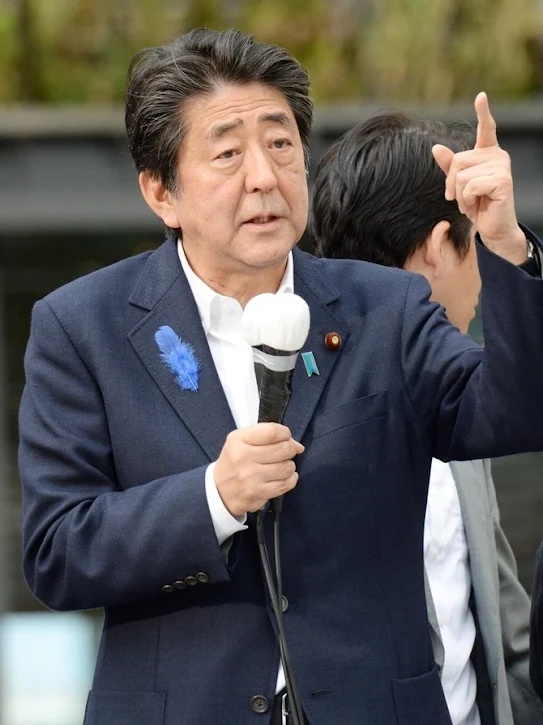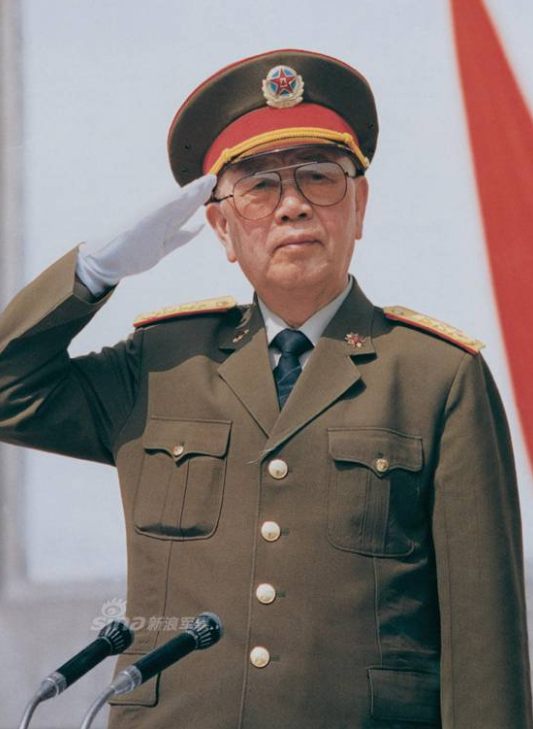→ウクライナに「必要な期間」支援継続-「戦争には負けていない」
 |
| 9月、台湾南部の屏東県で行われた実弾演習で、大砲を発射する戦車 |
バイデン氏は18日放映のCBS番組「60ミニッツ」で、台湾は独立している、あるいは独立すべきかとの質問には距離を置きつつ、米軍が「台湾を防衛」するのかとの問いには「実際に前例のない攻撃があればイエスだ」と回答。CBSがトランスクリプトを提供した。一方で、米国の「一つの中国政策」は変わっていないともインタビューの前半で改めて指摘した。
「われわれは以前に署名したことに同意する。そして一つの中国政策がある。台湾は独立に関して自ら判断する。われわれは独立を促してはいない」とし、「それは彼らの判断だ」と述べた。
米大統領、台湾防衛にイエス-「一つの中国」に同意は変わらず
バイデン氏はこれまでにも類似の発言をしたことがある。5月の訪日時には、台湾の防衛に必要な場合には「軍事的に関与」する用意があるかとの質問に対し、「イエス」と答え、「それはわが国が行った約束だ」と語った。ホワイトハウスの当局者はその後、火消しに回ったが、中国側から強い反発を招いた経緯がある。
米当局者は18日、バイデン大統領は以前と同じ点を指摘したとした上で、米国の政策は変わっていないと強調した。匿名を条件に今回のインタビューについて反応を示した。
また、バイデン氏はウクライナに対する米国の財政面でのコミットメントを重ねて示し、「必要な期間にわたり」支援を続けると表明した。ウクライナが勝利しつつあるのかとの質問には、殺りくや破壊が起きており、「勝利として見なすことは難しい」としながらも「戦争に負けてはいない」と答えた。
原題:Biden Says US Would Defend Taiwan in ‘Unprecedented Attack’ (1)(抜粋)
(バイデン大統領の発言を追加し更新します)
習主席が墓穴!空母威嚇が裏目に バイデン大統領「台湾防衛」を明言 「『第2のウクライナにはさせない』決意の現れ」識者―【私の論評】バイデン大統領の意図的発言は、安倍論文にも配慮した可能性が高いことを報道しないあきれた日本メディア(゚д゚)!
 |
| 安倍元首相 |
詳細は、この記事をご覧いただくものとして、以下にこの記事から一部を引用します。
バイデン氏は、中国に対して融和的発言はできないのでしょう。米国内では、そうしてしまえば、共和党やトランプ元大統領から徹底的に批判されるでしょうし、それどころか党内からも突き上げを食うことになるのでしょう。
米国においては、もはや中国に対峙する姿勢は、上下左右から支持され、米国の意思となったといって過言ではありません。現在米国では中国に融和的発言をすれば、米国に対する裏切り行為だと指弾されかねません。
台湾を巡っても、中国に融和的な発言をすれば、ウクライナ侵攻直前にロシアのウクライナ侵攻に米軍を派遣することはないと名言したときのように、大反発をくらい、それこそ中間選挙では大敗確実になるのでしょう。
そうしてこれには、4月12日にチェコ・プラハに所在地がある言論サイト「ブロジェクト・シンジケート」に安倍元総理が発表した、米国は台湾防衛に曖昧戦略はやめよと主張した英語論文の影響もあることでしょう。
安倍晋三元首相が今年4月12日、世界の経済、政治、科学、文化に影響力のある有力者の論評・分析を配信するウェブサイト「プロジェクト・シンジケート」に投稿したこの論考は、世界中で話題となりました。投稿して2日余りで米国、フランス、ドイツ、ウクライナ、インド、香港…と30カ国・地域近くのメディアで掲載されたというのですから、反響の大きさがうかがえます。同論文は瞬く間に反響を呼び、「ロサンゼルス・タイムズ」や仏紙「ルモンド」など、米国をはじめ30カ国・地域近くのメディアで掲載されました。
同論文では、ロシアによるウクライナへの軍事侵攻を台湾有事と重ねたうえで、米国がこれまで続けてきた「曖昧戦略」を改め、中国が台湾を侵攻した場合に防衛の意思を明確にすべきだと主張しています。
1979年、米国は中国と国交を結んで台湾と断交し、台湾に防御兵器を提供することを定めた「台湾関係法」を制定しました。しかし、中国が台湾へ軍事侵攻した場合、米国が軍事介入するかどうかについては明らかになっていません。安倍氏は、この「曖昧戦略」を見直すべきだと主張しています。
安倍氏はかねてより「台湾有事は日本有事」だと主張してきました。ロシアによるウクライナ侵攻において、バイデン米大統領は早い段階から「米軍は軍事介入しない」と明言しました。それがロシア軍の侵攻を加速させたことは間違いないです。台湾に関しても、米国が防衛の意思を明確にしなければ中国が実際に台湾へ侵攻することは容易に想像できます。
安倍氏は論考で、ロシアの侵略を受けるウクライナを台湾に重ね、米国が長く台湾について取ってきた「曖昧戦略」を改め、台湾防衛の意思を明確にすべきだと主張しています。
米国は40年以上前の1979年の台湾関係法に基づき、台湾自衛に必要な武器供与などの支援を行う一方、台湾と中国が武力衝突した場合、軍事介入して台湾を防衛するかどうかは言及しない曖昧戦略をとってきました。安倍氏はこれにこう異を唱えたのです。
「時代は変化している。曖昧政策は、インド太平洋の不安要因になっている」
ロシアのウクライナ侵略をめぐっては、バイデン米政権が早々に軍事介入の選択肢を否定したことが、ロシア抑止の失敗を招いたと指摘される。台湾に関しても、米国が防衛意思をはっきりさせないと、中国が米国は介入しないとたかをくくって行動に移る危険があるということでしょう。
そしてその事態は、ほぼ確実に日本に飛び火します。
安倍氏は、ウクライナ侵略が起きる以前の昨年12月1日の台湾のシンクタンク主催のオンライン講演で、すでにこう訴えていました。
「(中国による)台湾への武力侵攻は、必ず日本の国土に対する重大な危険を引き起こす。台湾有事は日本有事であり、日米同盟の有事でもある」
そして、同月19日の九州「正論」懇話会での講演ではこの発言の意図を説明しています。
「中国が台湾に侵攻すれば、日本の『存立危機事態』に発展する可能性がある。大変なことになるということを、あらかじめ明確に示しておく必要がある」
存立危機事態とは、安倍政権下の平成27年に成立した安全保障関連法が定めた日本が限定的に集団的自衛権を行使できる要件の一つである。密接な関係にある他国に対する武力攻撃により、日本の存立が脅かされる状態をいいますが、台湾有事もそうなりかねないです。
さて、安倍氏のこの論文、以下に英語の本文と、それを翻訳したものを掲載します。
 |
| 故郷の山口へ墓参りに帰った安倍氏 クリックすると拡大します |
US Strategic Ambiguity Over Taiwan Must End
Apr 12, 2022
ABE SHINZŌ
For 40 years, the United States has made a point of not saying whether it would defend Taiwan against a Chinese invasion, an approach that proved effective in deterring rash action by China and by pro-independence Taiwanese. But now that circumstances have changed, so, too, must America's strategy.
TOKYO – Russia’s invasion of Ukraine has reminded many people of the fraught relationship between China and Taiwan. But while there are three similarities between the situation in Ukraine and Taiwan, there are also significant differences.
The first similarity is that there is a very large military power gap between Taiwan and China, just as there was between Ukraine and Russia. Moreover, that gap is growing larger every year.
Second, neither Ukraine nor Taiwan has formal military allies. Both countries are forced to confront threats or attacks alone.
Third, because both Russia and China are permanent, veto-wielding members of the United Nations Security Council, the UN’s mediation function cannot be relied upon for conflicts in which they are involved. This has been the case with the current Russian attack on Ukraine, and it would also be the case in any crisis over Taiwan.
But the situation surrounding Taiwan is even more uneasy. While Taiwan has no allies, it does have the Taiwan Relations Act, a 1979 US law requiring the United States to provide Taiwan with the military equipment and supplies “necessary to enable Taiwan to maintain a sufficient self-defense capacity.” This law has functioned as a form of compensation for America’s unwillingness to say explicitly that it will “defend Taiwan” should it be attacked. This arrangement should now change.
In response to Russia’s aggression against Ukraine, the US stated early on that it would not deploy its troops in Ukraine’s defense. But when it comes to Taiwan, the US has adopted a policy of strategic ambiguity. This is the second point of difference: it remains unclear whether the US would intervene by force in a crisis involving Taiwan.
Don't miss what David Miliband, Laura Chinchilla, Bill McKibben, Mohamed Nasheed, and more had to say at our latest virtual event, Forsaken Futures.
Because the US prefers to leave undefined its position on how it would respond to an assault on Taiwan, China has (at least up to now) been discouraged from military adventurism. This is so because China’s rulers must account for the possibility that the US would indeed intervene militarily. At the same time, US ambiguity has forced Taiwan to consider the possibility that the US will not intervene militarily, and this has deterred radical pro-independence groups on the island.
The US has maintained its Janus-faced policy for decades. But the third, most important difference between Ukraine and Taiwan suggests strongly that it is time for the US to reconsider its approach. Simply put, whereas Ukraine is an independent state beyond any doubt, Taiwan is not.
Russia’s invasion is not only an armed violation of Ukraine’s territorial sovereignty, but also an attempt to overthrow the government of a sovereign state with missiles and shells. On this point, there is no controversy in the international community over the interpretation of international law and the UN Charter. While the extent to which countries participate in sanctions against Russia has differed, no country has claimed that Russia is not in serious violation of international law.
By contrast, China claims that Taiwan is “part of its own country,” and the US and Japanese position is to respect this claim. Neither Japan nor the US has official diplomatic relations with Taiwan, and most countries around the world do not recognize Taiwan as a sovereign state. Unlike in Ukraine, Chinese leaders could claim that any invasion of Taiwan that China launches is necessary to suppress anti-government activities in one of its own regions, and that such acts therefore would not violate international law.
When Russia annexed Crimea, the international community ultimately acquiesced, even though Russia had violated Ukrainian sovereignty. Given this precedent, it is not surprising that Chinese leaders may very well expect the world to be more tolerant should they, too, adopt the logic of “regional” – rather than national – subjugation.
This logic has made strategic ambiguity untenable. The policy of ambiguity worked extremely well as long as the US was strong enough to maintain it, and as long as China was far inferior to the US in military power. But those days are over. The US policy of ambiguity toward Taiwan is now fostering instability in the Indo-Pacific region, by encouraging China to underestimate US resolve, while making the government in Taipei unnecessarily anxious.
Given the change in circumstances since the policy of strategic ambiguity was adopted, the US should issue a statement that is not open to misinterpretation or multiple interpretations. The time has come for the US to make clear that it will defend Taiwan against any attempted Chinese invasion.
Whenever I met President Xi Jinping during my time as prime minister, I always made it a rule to convey clearly to him that he should not misjudge Japan’s intention to defend the Senkaku Islands, and that Japan’s intentions were unwavering. The human tragedy that has befallen Ukraine has taught us a bitter lesson. There must no longer be any room for doubt in our resolve concerning Taiwan, and in our determination to defend freedom, democracy, human rights, and the rule of law.
.png)



.png)
.jpg)











/s3.amazonaws.com/arc-authors/sankei/b2217cce-5ec4-4a61-9aaf-315aaf0dd307.png) 高橋洋一
高橋洋一









